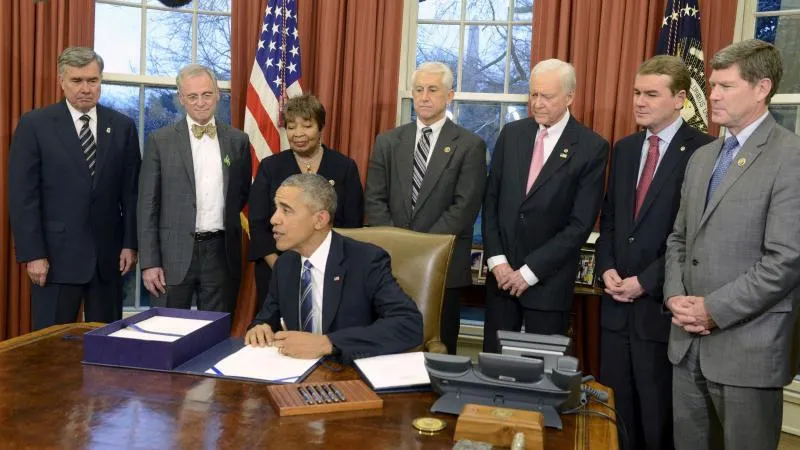Author: Commissioner R. Gil Kerlikowske

on February 24, 2016, as CBP Commissioner
R. Gil Kerlikowske (far left) looks on.
Photo Credit: Reuters
A little over 100 days ago, President Obama signed the Trade Facilitation and Trade Enforcement Act (TFTEA) into law. This Act is the most important piece of new legislation shaping CBP’s critical trade mission.
With this law, Congress and the Administration have sent a clear signal that security through U.S. economic competitiveness and enforcement of our trade laws and regulations are among our country’s highest priorities. The Act is also a major milestone for CBP, as it is the agency’s first authorization since its creation within the Department of Homeland Security in 2003.
In the first 100 days since the President’s signing, CBP has been working hard to implement the law’s key provisions, with a strong focus on bolstering our agency’s trade enforcement priorities.
First, CBP is renewing efforts to enforce the prohibition of goods manufactured with child, convict, or forced labor. By eliminating the “consumptive demand” exemption, goods made with these deplorable labor practices are no longer allowed into the country simply to meet U.S. demand.
I’m proud to say that – thanks to the tremendous efforts from our Office of Trade (OT) and CBP’s Office of Chief Counsel, I recently signed Withhold Release Orders for certain shipments of soda ash, potassium, and Stevia products made with convict and forced labor in China. These enforcement actions rightly place CBP at the forefront of promoting human rights, and send a powerful signal to manufacturers and producers around the world.
Second, under the leadership of Executive Assistant Commissioner Brenda Smith, OT has implemented a new process for swiftly and thoroughly reviewing allegations of evasion of Antidumping/Countervailing duty laws. This helps domestic manufacturers and companies hurt by unfair, illegal trade practices.
Third, to help implement these and other enforcement provisions of the new law, I created a Trade Enforcement Task Force within OT. This Task Force focuses on detecting high-risk activity and disrupting illicit trade networks that evade our trade laws – including laws that protect intellectual property rights and protect American businesses and consumers from unfair trading practices.
And CBP has made important progress in other key areas of the new law.
For example, we increased the “de minimis” value for an imported shipment has from $200 to $800. Our trade stakeholders save money by not having to pay processing fees for shipments below this value.
Additionally, the law formally recognizes and promotes the Centers of Excellence and Expertise (CEEs). Under the leadership of the Office of Field Operations and Executive Assistant Commissioner Todd Owen, all 10 Centers are fully operational, transforming the way we interact with our trade stakeholders.
For example, the Petroleum, Natural Gas & Minerals CEE has seen an 80 percent reduction in the number of protests, with a 65 percent reduction in processing time for its members. The new law affirms the CEEs’ modern approach to business, and I look forward to seeing them expand in the coming months.
And this is just the first 100 days.
We have much more ahead, developing new regulations required by the law, and further transforming the way we do business through automation and streamlining. I’m honored to be working with the men and women of CBP who are executing CBP’s broad trade mission, safeguarding the economic security of our country and enforcing our laws. I look forward to our next 100 days—and beyond.

